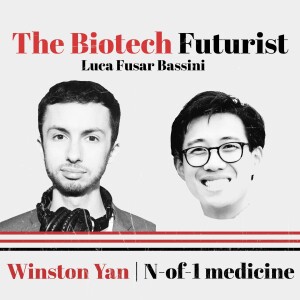
Monday Mar 20, 2023
The Genomic Surgeon And The Rise Of Interventional Genomics | Winston Yan
What if therapeutics for genetic diseases became as routine as transplant surgery?
Today I have the pleasure to discuss the rise of interventional genomics with the very unique Winston Yan. Winston did his PhD in the Feng Zhang lab in the very early days of the CRISPR revolution, founded Arbor Biotech, became a leader in the new field of interventional genomics with the N=1 collaborative to bring advanced therapeutics to patients with ultrarare diseases, and recently graduated from Harvard Medical School.
Winston and I discuss the rise of interventional genomics. We believe that genetic technologies are maturing enough to help several patients with ultrarare diseases, but there are several challenges that we try to analyze. These challenges include the impossibility of traditional case-control clinical trials, as each patients is indeed unique, the challenge of developing objective outcome measures to see if an intervention is working – as a no-change in the disease may be a great achievement for a drug when a disease would otherwise be rapidly progressing, and the challenges in making this field solid to collect data systematically and benefit all researchers, and, most relevantly, patients and their families. We discuss how Milasen, the first drug tailored to the disease of a single patient, paved the way to go “from Mila to millions”. We reason on how currently antisense oligonucleotides (ASOs) are the best developed tool, while in the long run CRISPR-based technologies may reasonably be the key. We also discuss patient selection criteria for enrollment in interventional trials in a setting where the risk is currently high. Winston borrows Tim Yu’s metaphor to describe interventional genomics, which I feel the need to report here. "When you really think about the first successful kidney transplantation, or any organ transplantation, these are incredibly complex medical procedures that are not just interoperatively challenging, but they have so many key things, such as the resources, the psychosocial support, the patient selection... This now has become routine because it works. The first successful kidney transplant was done on identical twins at Brigham, and that's a very rare population [...] But then, as you start to make transplants more broadly as you've seen this can work, you have to think about immune rejection, what are the ways to prioritize people, who are candidates, how do we expand from kidney to other organs too. And I think this analogy is so apt because this is the same set of challenges that we'll have to face to make N-of-1 individualized treatments with these new drugs, programmable medicines an accepted part of the medical practice, just like transplant surgery.” I feel lucky to have met Winston, and I am looking forward to talking to him again in a few years and see how things will have changed by then for genetic disease patients!
If you liked this episode, please consider subscribing to The Biotech Futurist on Spotify, Apple Podcast, Stitcher, Google Podcast, or your favorite platform, and leaving a positive review. The growth of this podcast depends critically on word-of-mouth. Thank you for your help. Follow The Biotech Futurist on Instagram and YouTube, and DM or email me if you have any curiosity. You can always download the transcript of this episode and find the links to the papers we mention on my website, lucafusarbassini.com. The jingle is by Gabriele Fusar Bassini.
RESOURCES
N=1 Collaborative: https://www.n1collaborative.org/
[ACADEMIC REVIEW] Therapies for rare diseases: therapeutic modalities, progress and challenges ahead: https://www.nature.com/articles/s41573-019-0049-9
[ACADEMIC] Milasen paper: https://www.nejm.org/doi/full/10.1056/nejmoa1813279
[OUTREACH] New York Times article about Milasen: https://www.nytimes.com/2019/10/09/health/mila-makovec-drug.html
Arbor Therapeutics: https://arbor.bio/who-we-are/
Comments (0)
To leave or reply to comments, please download free Podbean or
No Comments
To leave or reply to comments,
please download free Podbean App.